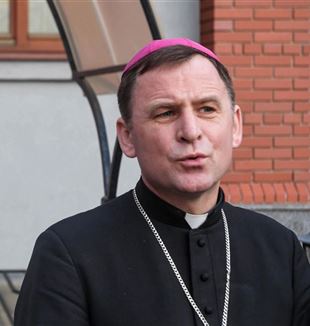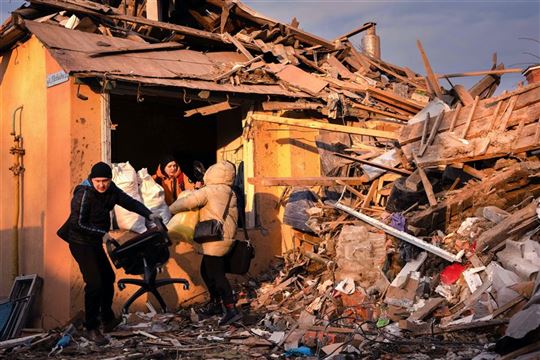
Ukraine: "called to remain men"
The two years of war recounted in the March issue of Tracce by the Bishop of Kharkiv, Pavlo Goncharyk: "Within the incomprehensible suffering we are experiencing, it is our relationship with God that allows us to be here for others and with otherUntil February 14, 2022, we almost did not even know it existed. Yet Kharkiv is Ukraine's second largest city: with over one and a half million inhabitants, it is an important university and industrial centre just a few kilometres from the Russian border. Then, on that day, the news started broadcasting images of bombed buildings, fleeing families, subways turned into bunkers. Kharkiv became a sort of new Sarajevo. It was right there that the CL community in Ukraine was born and flourished and, as part of the same story, also Emmaus, the NGO that helps disabled orphans, now also refugees in our country.
Monsignor Pavlo Goncharyk has been the Latin-rite Bishop of this city since 2020, appointed when he was just 42 years old. Under his care there are faithful living in the territories we have heard about in the war chronicles: Donetsk, Lugansk, Sumy, Bachmut, Mariupol. Since the beginning of the large-scale Russian invasion, he has never left his post. He shares with his faithful the life of those who remain in a city that does not stop living, but as soon as it is necessary flee to shelters, and then count the dead and wounded. To then start again. Or at least he tried. He agreed to tell us what he and his community have experienced during these months of war.
What have these last two years meant for you?
That is difficult to answer. It is complicated to find the right words. It is like when you are waiting outside the operating theatre for a loved one who is having a difficult operation. At some point the surgeon approaches you, but they do not quite know what to tell you. And you realise that the situation is serious. We see our country suffering: thousands of soldiers are dying at the front, many people are forced to flee their homes, those who remain live in terror of bombs. A country is like a body and its inhabitants are the blood: we are witnessing a haemorrhage.
What do you see happening?
I understand that it is difficult to understand, for those who do not see with their own eyes. In Kharkiv alone, 500,000 people have arrived who have lost everything: home and work. They are being hosted by people they know and do not know what will happen tomorrow. Cemeteries fill with new graves. It is physical and mental suffering. There are many suicides. Children cannot go to school and remain locked in bunkers. People lose hope and start drinking to escape from reality. A few days ago a missile hit a petrol pump. An entire family died. The mother clutched her son to protect him and they burnt to death attached to each other. They could not separate them. They buried them like that, in one coffin. But that is just one story among many. Then we hear in the news that Europe wants to stop helping the Ukrainian army. And this increases our suffering.
What are you doing to help the population?
Since the beginning of the war, our Christian community has been helping many people in need. With humanitarian aid arriving from Europe, through Caritas and many other organisations bringing food, medicine, clothes. We also try to assist people when they are forced to leave the riskiest areas.
What have been the most difficult moments for you?
The funerals of the young men killed at the front. You see their girlfriends, their parents. You think about the life plans they had made: starting a family, raising children. The war took it all away. Young men who died because someone wanted to start this tragedy, and who decided to go and defend their country and what they held dear. It is inexplicable suffering. The other heartbreaking moment is seeing families parting at the train station. They say goodbye without knowing if they will see each other again.
What helps you in this drama?
The awareness of who we are and what we were made for. What is happening asks a lot of me, but what generates me from within is my relationship with Christ. Through prayer, through dialogue with Him, I better understand myself and the meaning of my life. This is what everyone needs, I am convinced of it. My task, my mission is to help others find God and in Him find hope. I see so many priests and believers who, like me, are committed to this. Staying here is difficult, but we are clear about why we are staying.
Is prayer something to cling to in order not to sink into despair?
The point is not to find a foothold. It is to remember what we are, what I am. And I am a man. Our vocation is to remain men. And what allows this, even within the incomprehensible suffering we are experiencing, is our relationship with God. That is what allows us to be there in this situation. My vocation is to be there, to be here for others and with others. It is this that has increased my awareness of my faith and knowledge of who Christ is.
Then, because of your role, you have had to make decisions.
Yes, but what I just said is necessary first. When I get to answer the question of who I am, then I will also understand how I can move. The answer to this question starts from an experience of Christ's love. Through my relationship with God I discover this love and within this good I discover who I am. It is a very strong and deep feeling, which no one can destroy.
I am happy when I am myself. When a mother and father love their child, the child feels strong.
So, is it necessary to recover the awareness of being loved?
Rather than 'awareness', I say 'experience'. That is what I am experiencing. I also see it in others, who can no longer think of a life without the experience of Christ's love. I once asked a lady: "Can you imagine what your life would be like without the encounter with Jesus? What would it be like?" Her answer was: "Miserable". Today, it is misery that unites both sides of the war: those who attack and those who defend. The circumstance we are experiencing has within it a cry: "We need God". We need to understand this, we need to experience the response to this need. Only then can we have peace in our hearts.
And you have understood this more during these years of war?
Yes, it is the most important discovery of my life.
Read also - Easter 2024. The CL poster
What can we do to help you?
Everything you do for your country, you also do for us. To make a country great and strong, it needs its people to be. Therefore, faith, the relationship with Christ, must be rediscovered. How one looks at and evaluates the things that happen in the world depends on this, even what happens to us in Ukraine. And the name we give to the things that happen also depends on this, the way we look at the people who flee and the judgement we make. The way we talk about things influences the way we act.
So what can we do?
You can help us simply by speaking of the war in Ukraine. Say that Ukrainians are protecting their country and that Putin is the aggressor. You are helping us if you do not say that we must surrender and that the solution to the war is to give Putin part of our country in exchange for peace. It is a question of justice. You cannot ask us to stop defending ourselves. This is important. Then help the many Ukrainians who are Italy. Pray for peace during your Masses. And, if you want to do more, offer us your friendship by coming to visit us with humanitarian aid. You have done it and you are still doing it. And for this I thank you.